Tidio AI Review (2025): Key Features, Pricing & Insights
Tidio AI is a multichannel customer communication platform that combines live chat, AI-powered chatbots, and no-code automation, with a strong focus on SMB and ecommerce use cases.
Its intuitive workflow builder, native integrations (especially with Shopify and Instagram), and context-aware Lyro AI bot enable fast deployment and effective handling of routine support and sales conversations, though customization and advanced analytics are limited compared to top enterprise competitors.
This review covers Tidio AI’s core features, pricing structure, automation capabilities, integration options, real user feedback, pros and cons, scalability concerns, available templates for fast setup, and a comparison with leading alternatives like Big Sur AI, Intercom, and Zendesk.
What is Tidio AI?
Tidio AI is an AI-powered customer communication platform.
It lets you automate customer support and sales conversations across chat, email, and messenger channels by building workflows and deploying chatbots that integrate with your existing CRM or e-commerce tools.
Tidio AI at a glance
Our verdict: 7.5/10
Tidio AI shines as an accessible platform blending live chat, AI-powered chatbots, and automated customer service tools into a single interface for SMBs and e-commerce. Its visual no-code automation builder allows for rapid deployment, and Tidio’s mix of AI response and human support is a key differentiator. The advanced Lyro AI chatbot (launched in 2023) offers context-aware, natural-sounding answers for web chat.
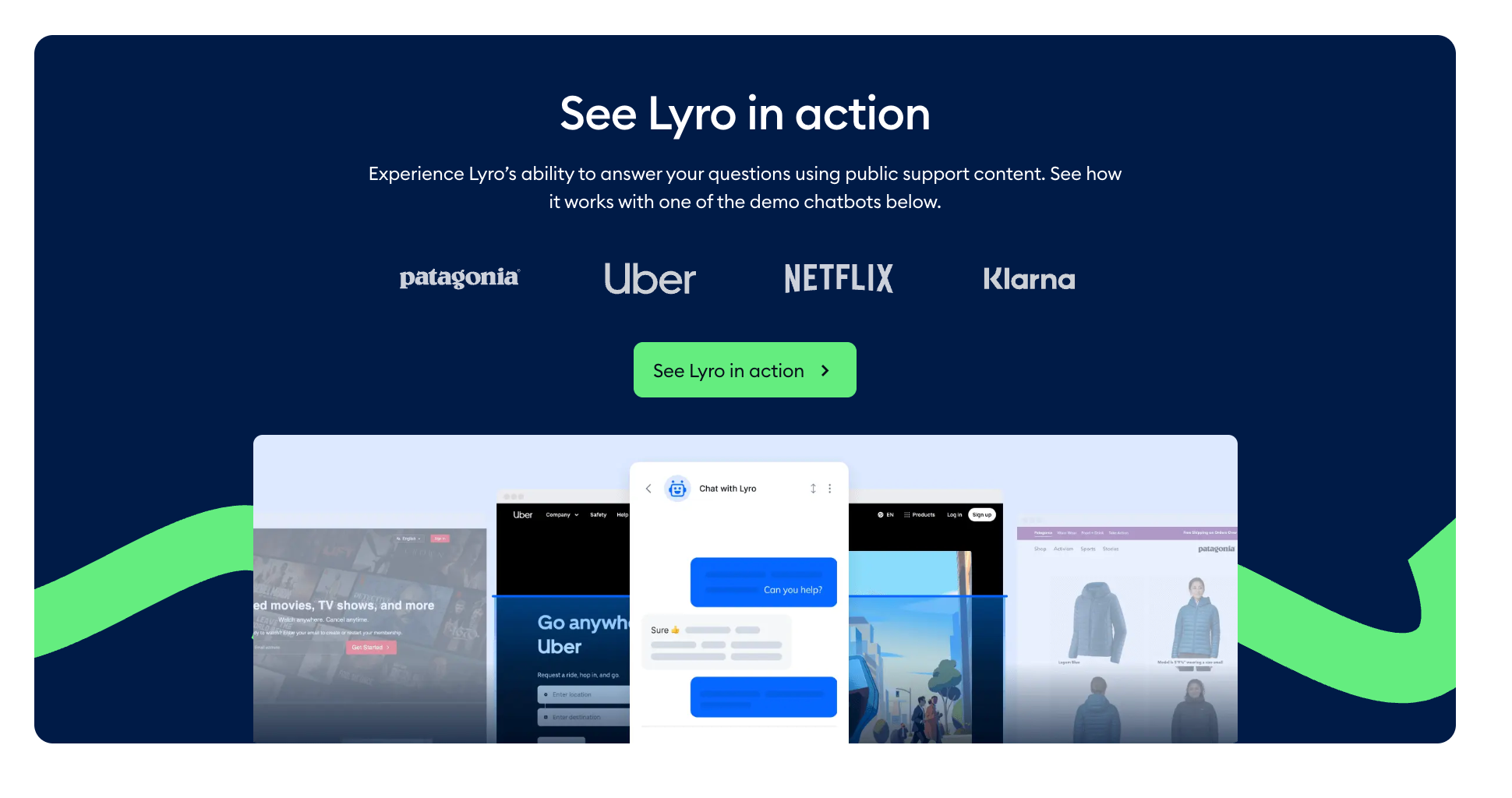
However, its AI capabilities are optimized for routine e-commerce use cases, and some features (such as dynamic personalization and deep workflow automation) lag behind newer competitors. Integration breadth is strong, but customization and training options for advanced teams are limited.
Customer support is responsive but sometimes slower on lower-tier plans. If you want more open-ended model customization, Big Sur AI may be a stronger fit.
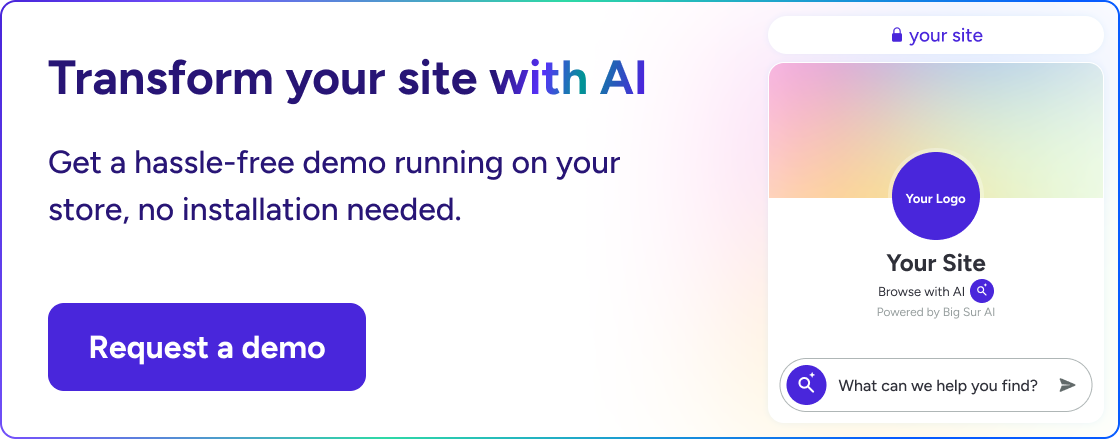
Average customer rating
Capterra: 4.7/5 from 470+ reviews, praised for user-friendliness, multi-channel support, and time-to-value. Some highlight limited chatbot depth and reporting as constraints.
G2: 4.6/5 from 600+ reviews, with high marks for live chat, Shopify integration, and onboarding. Users cite room for improvement in the AI’s ability to handle complex queries.
Best for
- Ideal use cases: Automating e-commerce support, FAQs, shipping/order updates, and capturing leads via web chat widgets.
- Strengths: Fast onboarding, live/human handoff features, robust third-party integration (Shopify, Wix, Messenger, Instagram), flexible visual flow builder, and auto-translation in supported plans.
Typical users
- Growth-focused online stores (Shopify, WooCommerce), SaaS businesses, and customer service teams seeking a one-stop chat + automation suite.
- User roles typically include e-commerce marketers, sales managers, support staff, and technical leads across industries with chat-based customer engagement.
Flagship customers
Trusted by 300,000+ businesses globally, including teams at Sony, Mercedes-Benz, Columbia University, eSky, Praktiker, and Visit Norway.
Endorsements emphasize ease of setup, sales conversion boost, and seamless multi-channel support.
Pricing snapshot
| Plan | Price (monthly) | Key Features |
|---|---|---|
| Free | $0 | Live chat, 50 conversations/month, basic automation templates, email support |
| Starter | $29 | Up to 100 active conversations/month, basic chatbots, visual automation, 3 users |
| Communicator | $25 | Expanded live chat features, reporting, unlimited chat history for 5+ users |
| Lyro AI (add-on) | From $39 | Unlimited AI support chats, smart intent recognition, knowledge base auto-training |
| Enterprise | Custom | Dedicated CSM, onboarding, compliance, advanced routing, and priority support |
| Note: Pricing scales with use, channels, and AI add-ons. SMS, Multichannel, and Premium integrations available as extra modules. | ||
Strengths & weaknesses
✔ Pros
- Onboarding is seamless, with prebuilt workflows and no-code flow editing for e-commerce.
- AI-powered Lyro chat gives accurate, context-aware answers for store support and order questions.
- Integrates natively with Shopify, Wix, Messenger, Instagram, WordPress, and 30+ other e-commerce tools.
- Robust multilingual auto-translation on higher plans.
✘ Cons
- AI customization is limited by built-in flows, with less control over prompt logic and fallback.
- Can become expensive at volume or when stacking AI and multichannel modules.
- Advanced analytics, deeper conversation design, and open integrations require higher plans.
Notable capabilities
Tidio AI’s edge lies in its hybrid model, which combines agent chat with automation, making it easy for small teams to provide always-on support without sacrificing a human touch.
Setting up Lyro AI from a knowledge base or FAQ is intuitive and faster than most rivals. Integration options make Tidio highly appealing for Shopify and multi-channel e-commerce shops.
Its conversational AI works out-of-the-box for common retail scenarios, delivering quick time to value.
How to use Tidio AI the smart way
Tidio AI is a suite of smart tools for automating conversations, capturing leads, and resolving customer issues fast.
Here’s how to get up and running with the most effective setup 👇
1. Jump into AI-powered conversations
From the main dashboard, go to the AI tab.
Turn on Tidio AI Replies to instantly automate common support questions or sales chats with AI-generated responses.
2. Upload product knowledge and FAQs
In Settings, navigate to the AI Trainer ⤵️
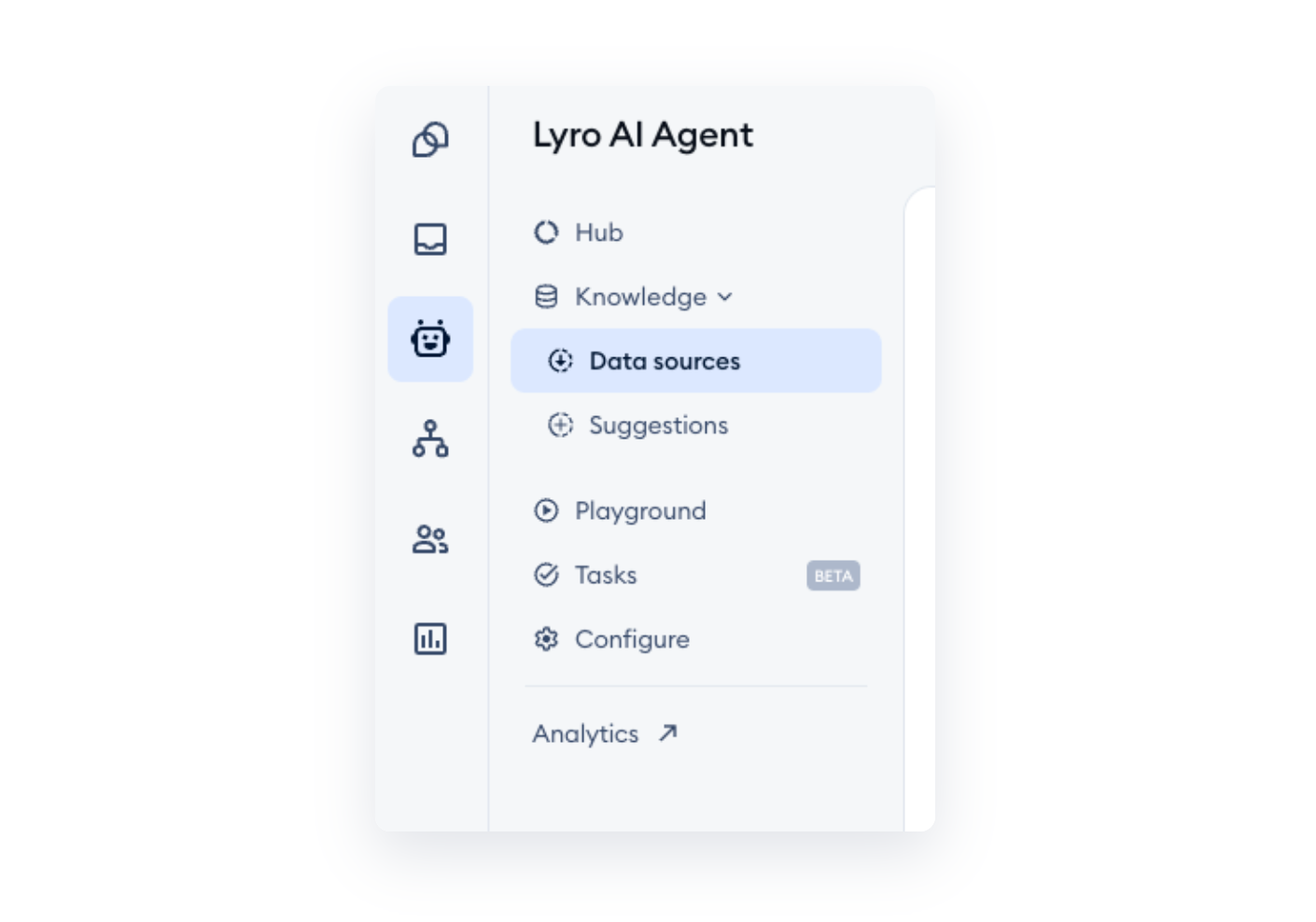
Add your knowledge base: import FAQs, copy-paste support docs, or pull from your site. This makes the AI context-aware and helps it give precise, brand-specific answers.
3. Create targeted automation flows
Switch to the Automation section ⤵️
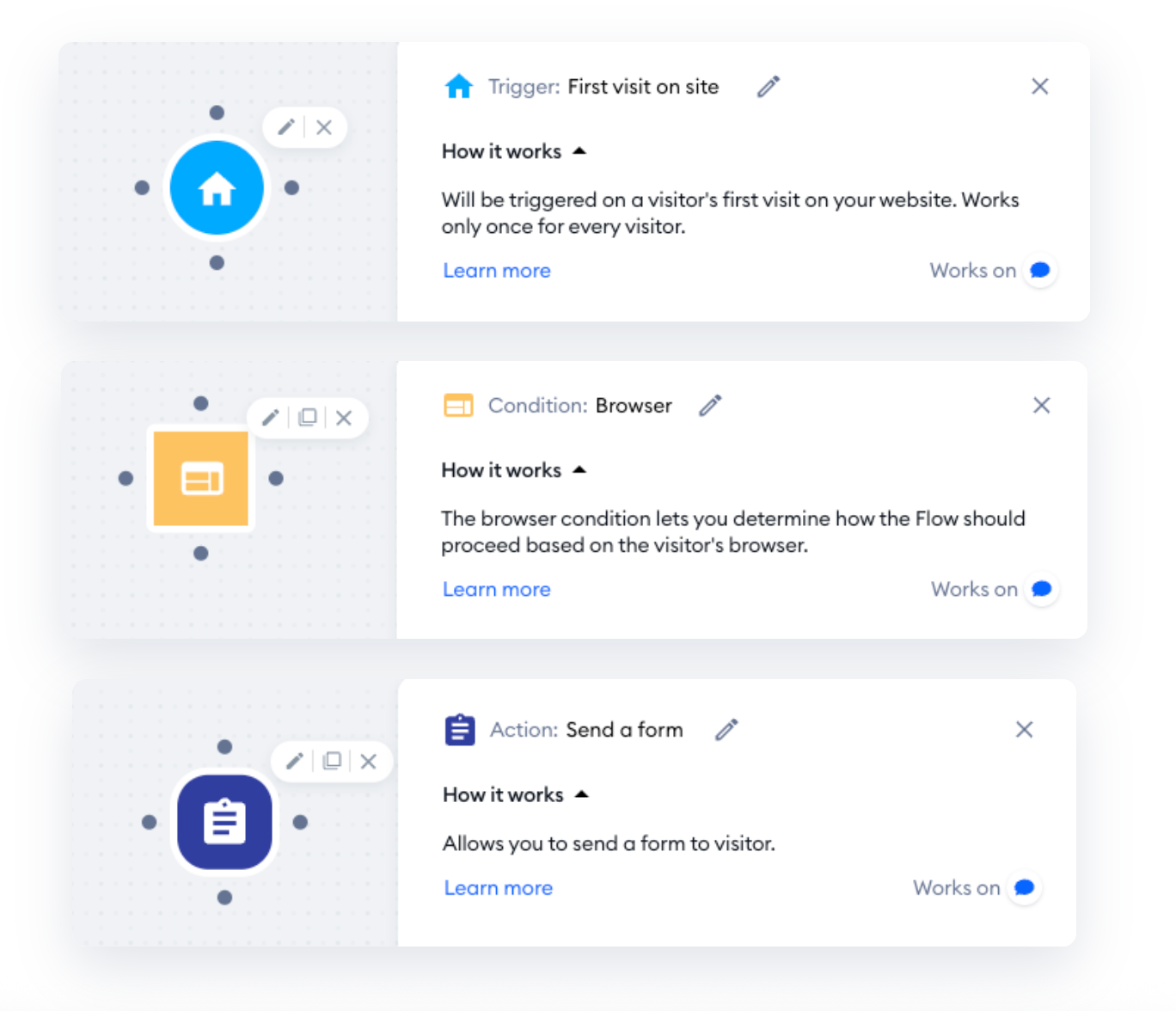
Build custom Workflows for repetitive tasks (e.g., order status, returns, booking calls). Let AI handle routine questions while you keep full manual control for complex cases.
4. Choose your preferred AI model
Select from Tidio's default AI, GPT-4, or bring your own key for OpenAI—whichever fits your data and privacy needs best.
5. Set human handoff rules
Configure triggers so that tricky, high-value, or sensitive chats escalate to a live agent automatically. This avoids dead-ends and keeps CSAT high.
6. Deploy across all channels
Add Tidio to your website with a code snippet ⤵️
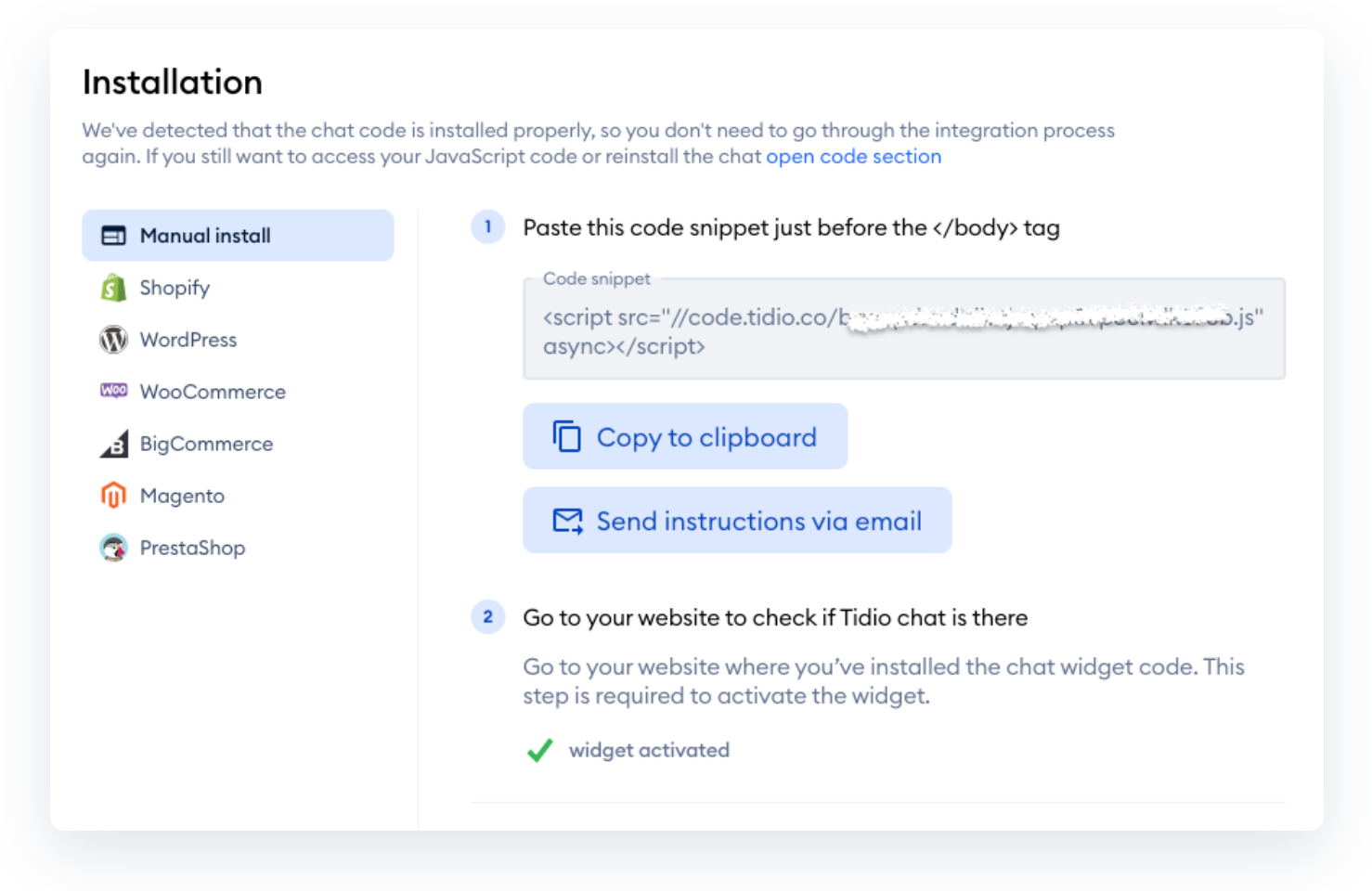
Integrate with Messenger, Instagram, WhatsApp, or email to cover all your support frontlines instantly.
7. Monitor performance and train further
Review conversations in the Inbox and Insights sections. Spot failed answers, add missing info to your knowledge base, and continuously refine your AI for even better accuracy.
Action summary for fastest results:
- Sign up at tidio.com and complete onboarding
- Upload your unique knowledge base and set up first automations
- Fine-tune handoff rules to live agents
- Integrate everywhere your customers are
- Review performance and optimize weekly
Use product screenshots to guide every step ⤵️
Tidio AI's most popular features?
Here are the five most popular Tidio AI features that users consistently praise, based on forum feedback and real reviews:
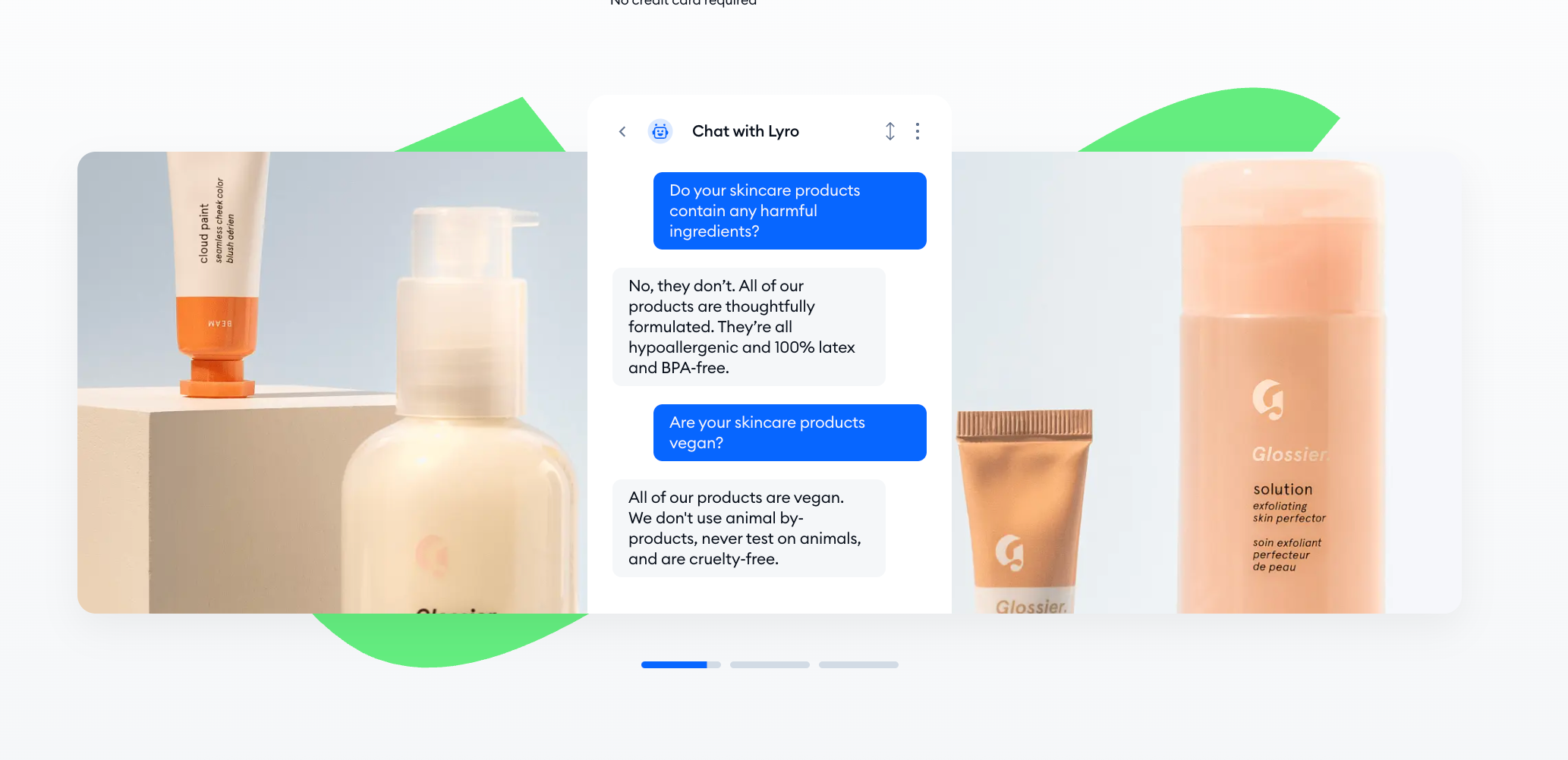
- Multichannel inbox for seamless customer conversations: Tidio centralizes all customer messages from live chat, email, Instagram, Messenger, and WhatsApp into a single, unified inbox. This allows support teams to manage interactions from every channel efficiently, prioritize urgent inquiries, and maintain response continuity without toggling between platforms.
- AI-powered Lyro chatbot for automated support: The Lyro chatbot uses conversational AI trained directly on uploaded FAQs, website content, or custom knowledge bases. It can resolve up to 70% of repetitive queries without human intervention, provides instant answers tailored to your business, supports fallback to human agents, and delivers analytics on AI-handled conversations so teams can optimize automation.
- Automated workflows for sales and lead qualification: Tidio allows users to design visual automation flows that capture leads, segment customers, and nudge visitors toward conversion. Triggered sequences can initiate personalized greetings, upsell or cross-sell products, route high-intent prospects to live agents, and qualify new leads based on custom rules or behavioral data.
- Real-time visitor tracking and proactive engagement: The platform provides a dashboard for monitoring who is browsing your site, which pages they view, and how long they stay. You can send targeted chat invitations, auto-promotions, or answer questions when specific triggers are met, enhancing conversion rates by engaging with potential customers at critical decision moments.
- Shopify and ecommerce-specific integrations: Tidio offers deep integrations with Shopify and other ecommerce platforms. This includes features like automated order status checks, personalized recommendations, streamlined checkout support, abandoned cart recovery messages, and product suggestions, directly within the chat interface to reduce friction and boost sales.
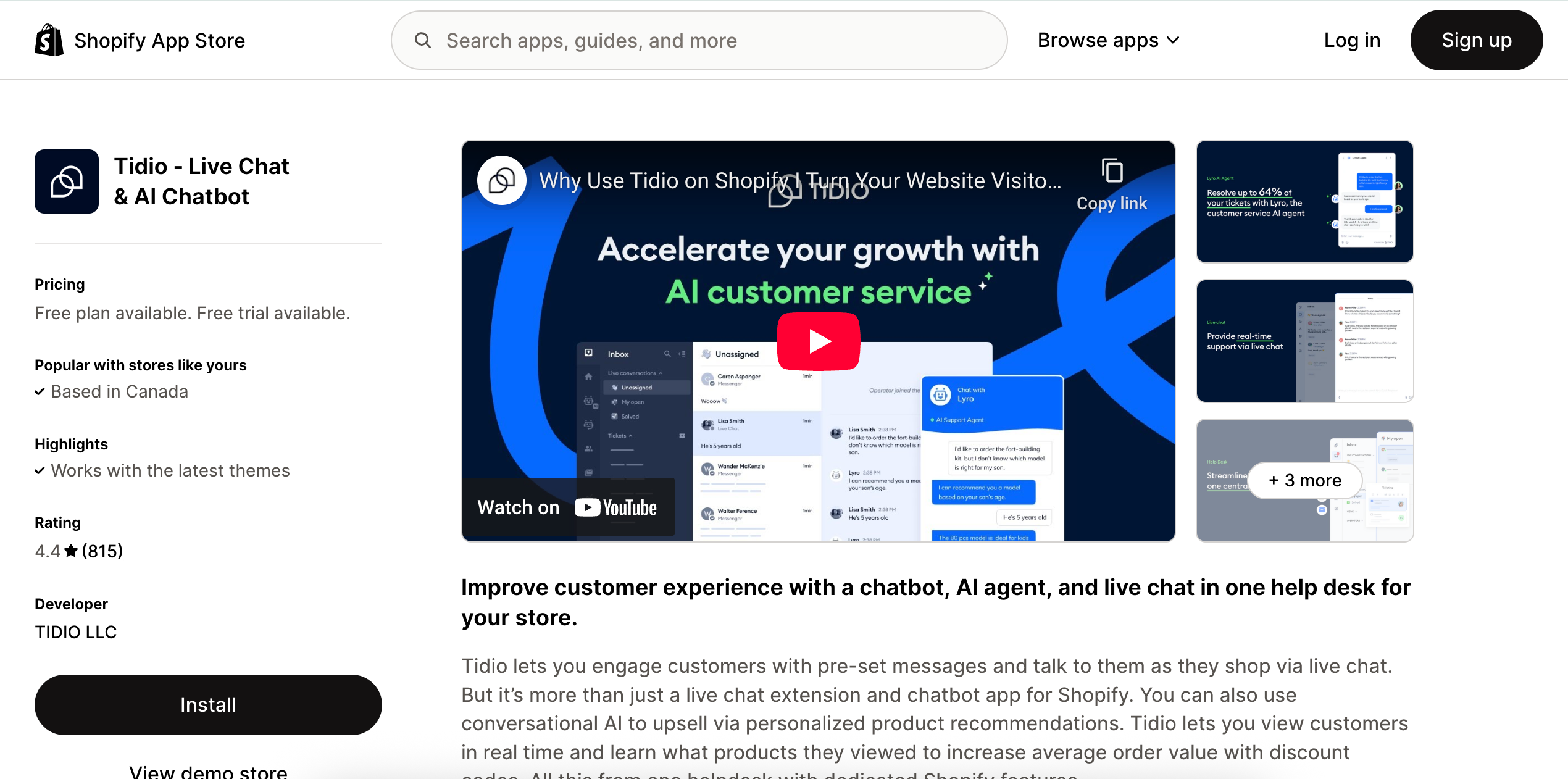
💡 TL;DR → If you care about unified multichannel communication, advanced automation, website visitor tracking, and robust ecommerce integrations, Tidio AI is a great pick. If you value deep language model customization, niche CRM capabilities, or advanced intent recognition, maybe consider alternatives.
Tidio AI's customer reviews: The Good & the Bad
🎯 Overall Ratings
Capterra: 4.7 / 5 (476 reviews), high praise for usability and customer engagement features
G2: 4.6 / 5 (528 reviews), users consistently highlight multi-channel communication and automation
Trustpilot: 4.2 / 5 (2,135 reviews), positive comments center on onboarding and customer support, with some negatives about billing and advanced customization
Reddit & SaaS forums: Generally favorable, but technical users cite data limitations and integration quirks
Shopify App Store: 4.8 / 5 (1,658 reviews), with frequent mention of fast implementation and ecommerce integrations
👍 The good
Smart visitor segmentation
Many users appreciate the AI-powered segmentation that recognizes visitor intent in real-time and tailors engagement accordingly, even on high-traffic ecommerce stores. One G2 review says:
“Tidio’s visitor segmentation allows our team to see exactly where users get stuck on our checkout funnel and trigger proactive support. We were able to recover more abandoned carts than with our previous tool.”
Advanced automation flows with triggers
Customers highlight the ease of building multi-step, conditional automation flows not just for chat, but also for email and messenger channels in one system. As one Capterra reviewer puts it:
“The drag-and-drop automation builder lets us deploy sophisticated sequences (like proactive discounts tied to user behavior) with little technical effort. Rare to see both live chat and email combined this way.”
Multilingual chatbot
Advanced users have noted that Tidio’s multi-language auto-switching and intent detection work seamlessly for stores with diverse audiences. According to a Shopify review:
“We run campaigns in English, French, and Spanish. Tidio correctly switches bot replies based on detected language, which removed the need for separate chatbots per region.”
Integration with ecommerce CRMs and order tracking
Some reviewers call out the deep Shopify, WooCommerce, and Zapier integrations, especially order status syncing and direct refunds from chat. From the Shopify App Store:
“Tidio’s Shopify orders integration let our agents manage, refund, or update orders without leaving the chat dashboard. That’s saved us a ton of time.”
👎 The bad
Event limit restrictions on free and mid-tiers
Unlike some competitors, Tidio caps the number of chatbot engagements and automation triggers per month on most plans. One Trustpilot review states:
“We hit the automation cap quickly during a sales event and had to wait until the next cycle or pay for overages, which wasn’t clear upfront.”
Visual customization rigidity
More advanced users feel limited by Tidio’s visual chat widget customization. From a G2 review:
“I wanted our chat widget to match our brand fonts and button radius exactly, but customization is locked down to a few styles. CSS overrides aren’t officially supported.”
GDPR and data residency concerns
European users and privacy-conscious businesses have voiced uncertainty about Tidio’s data handling and server locations. A post on Reddit r/legaladvice says:
“GDPR compliance is advertised but there’s no clear information where data is stored. Our DPO had to email support twice for specifics.”
Conversational AI limitations for nuanced queries
Some technical users report that the AI chatbot can struggle with complex, multi-step questions, and offers only basic fallback logic. As one Capterra reviewer notes:
“If customers ask layered questions, the bot sometimes responds inaccurately or sends them in circles, and editor options for training context are pretty basic compared to Dialogflow or GPT-based systems.”
Pricing: How much does Tidio AI cost?
Tidio AI uses a tiered, pay-as-you-grow pricing model based on the number of conversations and included features.
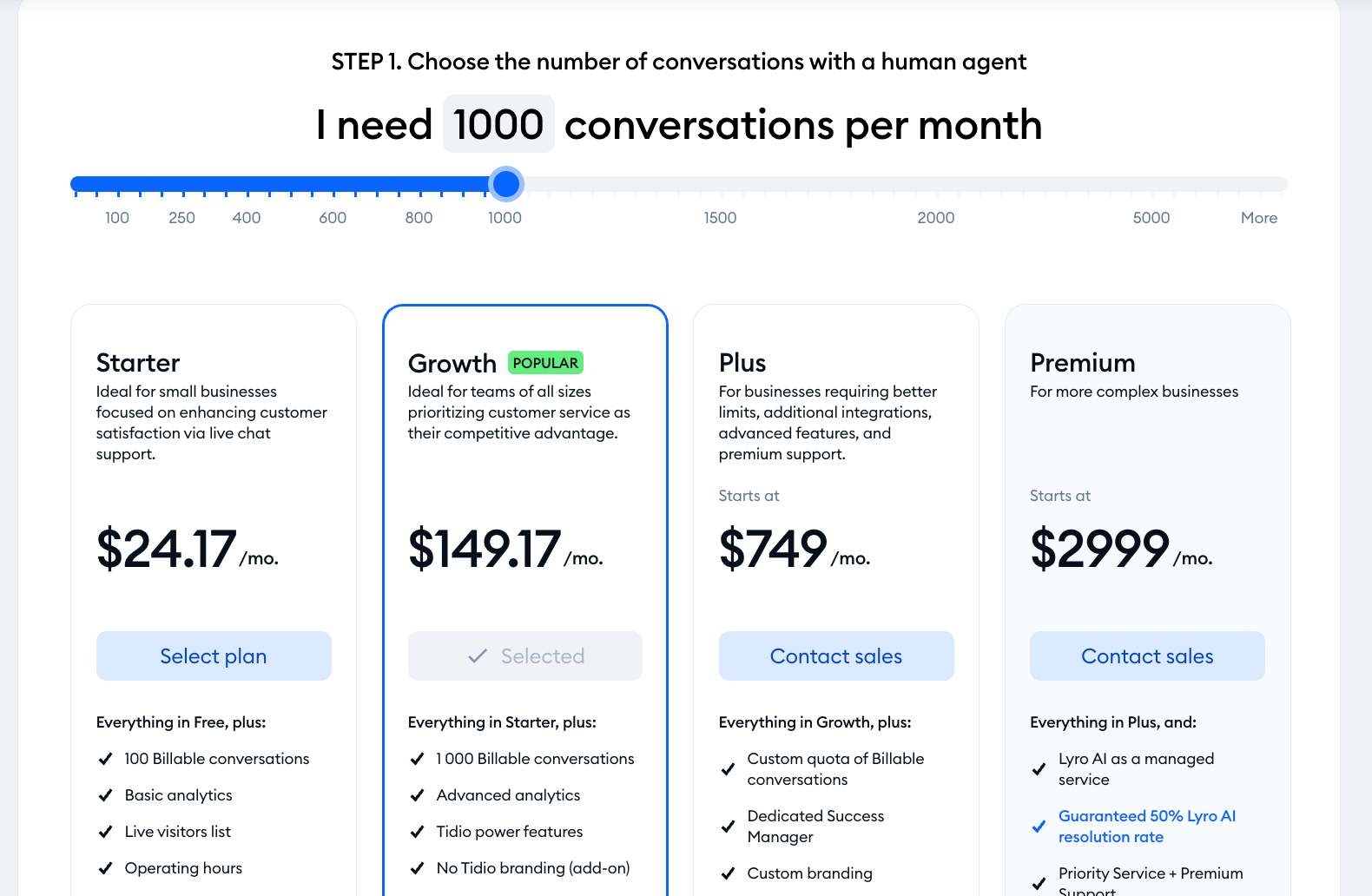
Choose between these 4 plans:
- Starter - $29/month, includes unlimited seats, 1,000 conversations, up to 50 active visitors, live chat, tickets, and email support
- Communicator - $25/month per seat, includes unlimited conversations, unlimited visitors, advanced live chat features, tickets, email, team departments, and live visitor monitoring
- Chatbots - $29/month, includes 2,000 chatbot triggers, unlimited seats, live chat, prebuilt chatbot templates, drag-and-drop chatbot builder
- Tidio+ - from $394/month, includes everything in lower plans plus higher limits, advanced analytics, premium onboarding, custom features, and a dedicated account manager
Price limitations & potential surprises
- All plans have hard caps on chatbot triggers or conversations—overages require manual upgrades or contacting sales.
- The Communicator plan is seat-based and can get expensive with a larger team; Chatbot triggers or conversations do not roll over monthly.
Add-ons?
No core add-ons are listed on Tidio's pricing page as of June 2024, but plan upgrades and custom feature development are available through Tidio+ or by contacting sales.
💡 Tidio AI's pricing scales with either the number of conversations, seats, or chatbot triggers, and larger usage or advanced features may require a switch to custom or enterprise plans.
Tidio AI vs competitors: Workflows, automation & integrations
Visual workflow builder allows rapid automation setup
Drag-and-drop editor enables users to build multi-step workflows for lead capture, support routing, and drip messaging. Pre-built templates help automate common use cases like abandoned cart follow-up and FAQ handling.
Event-based automation with conditional logic
Automations can trigger on page views, visitor actions, or custom events. You can branch logic using user attributes like location or purchase history, and send webhooks or perform actions in external apps.
Integration ecosystem covers ecommerce and CRMs
Native integrations include Shopify, WooCommerce, Magento, Hubspot, and Zapier. Data from chats can update external records, trigger CRM flows, or pass contact data to email marketing tools.
API and webhook capabilities for custom workflows
Tidio API allows pushing and pulling data to and from the platform. Webhooks enable real-time event handling in custom stacks, ensuring seamless connection with in-house or third-party systems.
Multichannel deployment from a single workflow
Automations can operate across chat widgets, Messenger, Instagram, and email. One workflow can route conversations to agents, escalate to email, or update CRM, regardless of channel origin.
💡 TL;DR → If you care about visual workflow building and ecommerce-focused automations, Tidio AI is a great pick. For more advanced, cross-platform integrations or out-of-the-box AI copilots, consider Intercom, Zendesk, or try https://bigsur.ai/ for a ready-to-deploy agent.
Is Tidio AI scalable?
Tidio AI offers three main pricing tiers with a mix of user-based and volume-based limits. The Plus plan is capped at 5,000 conversations/month; the higher-level plans lift this to 40,000+, but after that you need to talk to sales for custom enterprise pricing.
Pricing friction points
Once your volumes outgrow basic tiers, the cost per conversation rises quickly. There’s no granular middle ground—if you exceed limits by even a small margin, you move into a new, much higher price bracket, or have to negotiate custom plans. Overages are handled via plan upgrades only, not per-message add-ons. Expect price jumps if your chat usage scales unpredictably or seasonally.
Technical scalability
Tidio handles moderate traffic reliably (several thousand chats per month), but users scaling up to tens of thousands of chats have reported slower dashboard response times and occasional lag during peak hours. As with most multi-tenant SaaS platforms, resources are shared, so rapid spikes in usage can introduce delays. Large teams may also find its agent management and customization features less robust than those of dedicated enterprise platforms.
Actionable considerations
Audit your expected chat volume carefully. If you anticipate volatile or rapid growth, factor in both sharply rising costs and the need for custom support. For growth beyond 40,000 chats/month, involve Tidio’s sales team early to avoid service interruptions or slowdowns. For truly large-scale deployments, request technical benchmarks and consider running a trial at peak capacity before committing.
Does Tidio AI offer templates to get going quickly?
Yes, Tidio AI provides a solid library of pre-built chatbot templates spanning eCommerce, lead generation, and customer support use cases. These templates reflect common workflows and industry best practices, like cart recovery, FAQ handling, and customer welcome sequences.
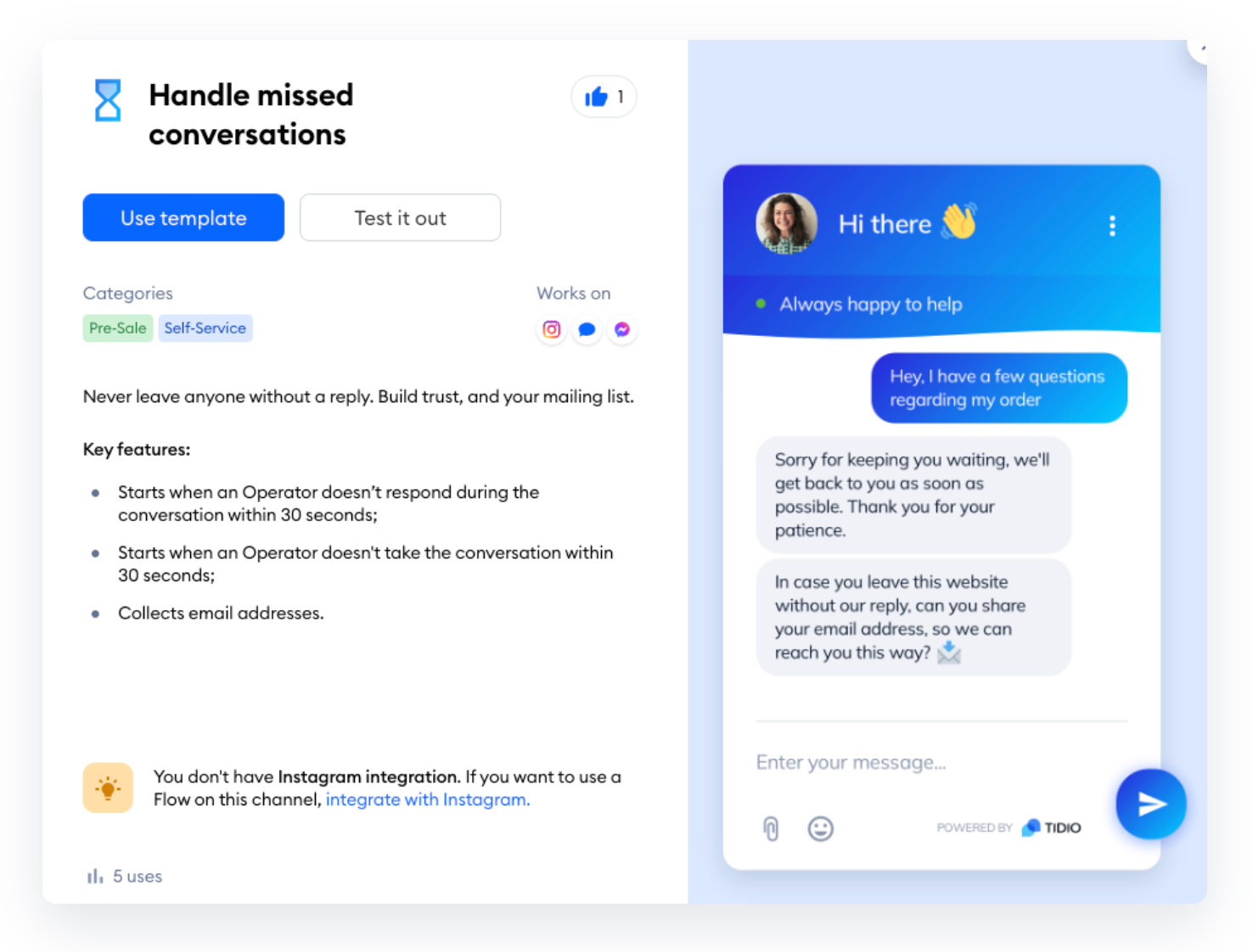
How Tidio AI streamlines setup
You can browse and activate templates directly from the dashboard, then tailor triggers, responses, and automation logic to match your requirements. Editing variables or adding product-specific FAQs is simple via the drag-and-drop builder. Tidio’s templates cover scenarios like order tracking, personalized product recommendations, and collecting visitor contact info, giving you a strong baseline to launch with minimal manual setup.
What’s the best alternative to Tidio AI?
✅ Best “Ready-Made” Alternative: Big Sur AI
If you want the best option for a turnkey, production-ready chatbot you can launch fast, Big Sur AI is the clear choice.
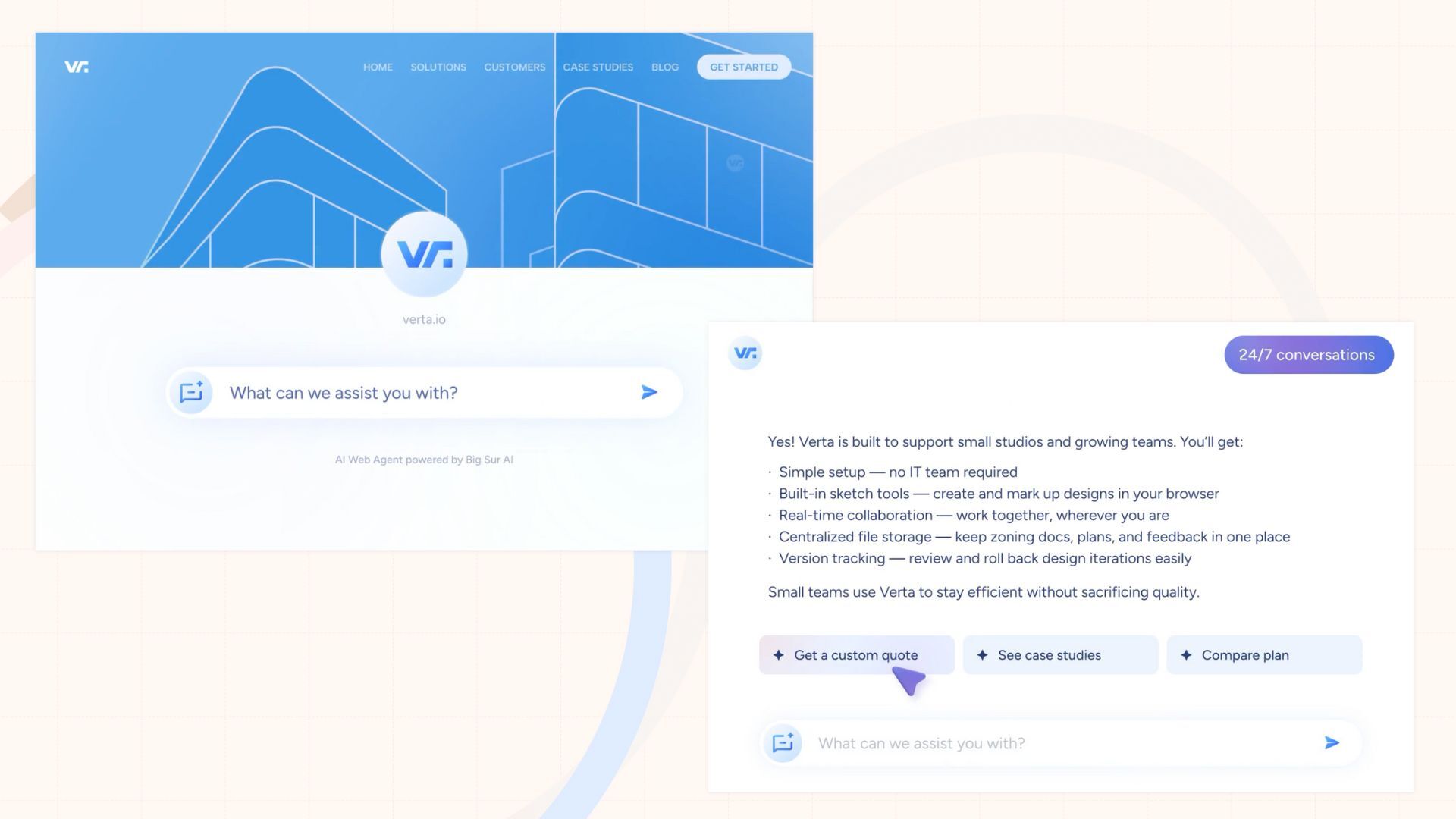
Why?
Big Sur AI is built specifically for businesses that want a high-quality, no-code chatbot with minimal setup and an exceptional user experience. Unlike general-purpose builders like Tidio AI that often require manual scenario configuration and ongoing training, Big Sur AI is engineered to deliver value right out of the box.
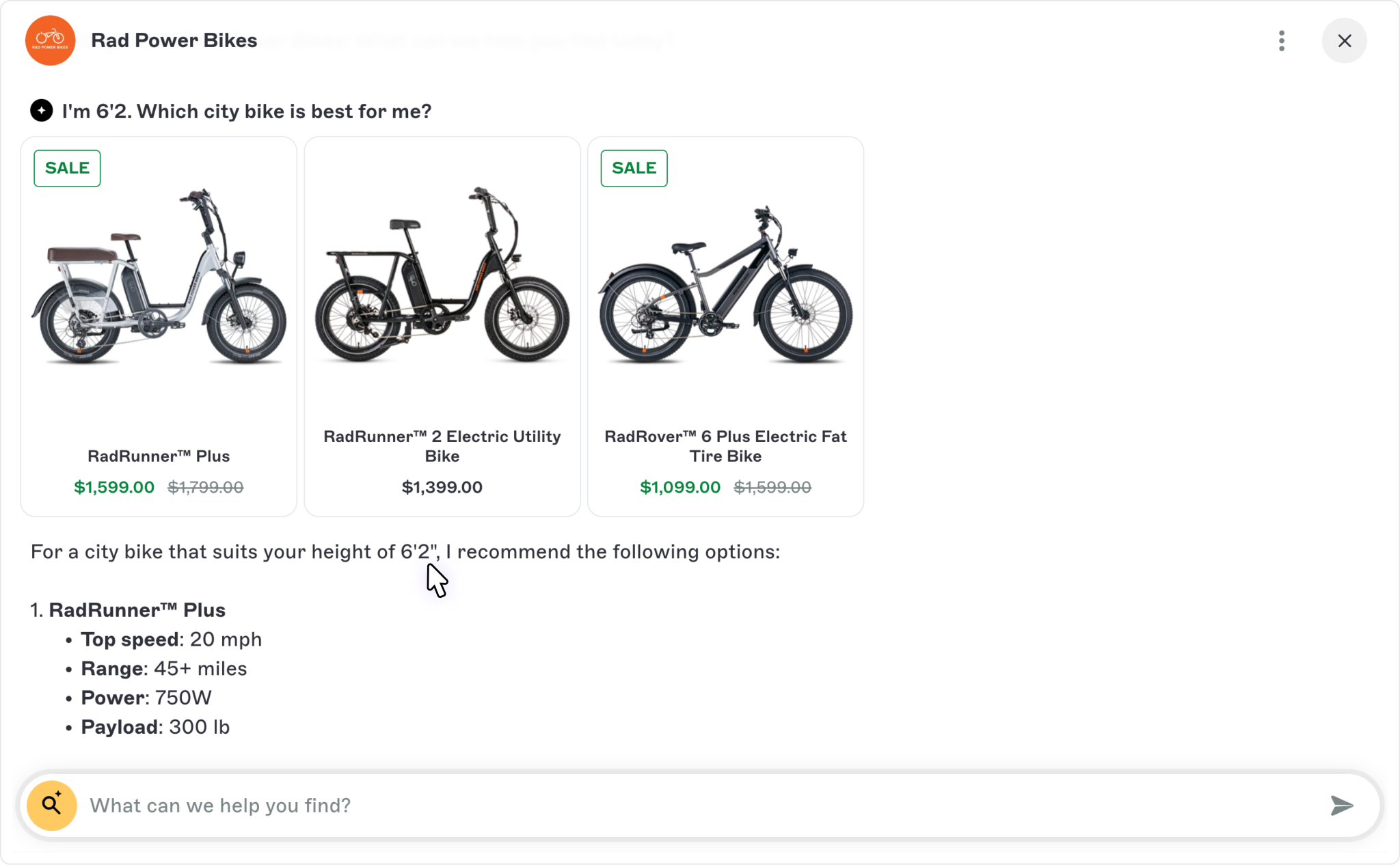
Here’s what makes it stand out:
- Pre-trained, optimized conversational AI that handles both simple and complex questions without the need for exhaustive manual setup.
- Sleek, customizable widget you can embed on any website instantly—perfectly aligning with your brand’s look and feel.
- Advanced performance with LLM-powered search, dynamic recommendations, and robust content automation (beyond basic Q&A).
- Built-in lead capture and automated routing—so your chatbot turns visitors into qualified leads and customers seamlessly.
- Simple, powerful integrations with CRMs, Zapier, and webhooks for full workflow automation.

Bottom line 👇
If you want a chatbot that “just works,” providing accurate responses, beautiful design, and minimal time spent on training or setup, Big Sur AI is the best ready-made alternative to Tidio AI. It's a top choice for small businesses, agencies, and organizations seeking production-ready automation without the headaches.
Top 5 Alternatives to Tidio AI
| Tool | Best For | Key Strength | Drawbacks | Pricing |
|---|---|---|---|---|
| Big Sur AI | Businesses wanting advanced, pre-built AI agents that handle conversations across channels | High-quality out-of-the-box AI, no-code automation, easy web/app integration | Fewer e-commerce-specific features out of the box (vs. Tidio); newer brand | Starts at $49/mo |
| Intercom | Scalable support automation for larger teams and enterprise | Robust helpdesk suite, multichannel, powerful AI routing | Complex UI, higher learning curve, expensive for small businesses | From $39/mo (Starter); AI add-on extra |
| Zendesk AI | Companies already using Zendesk for customer service | Seamless ticketing/chat integration, enterprise-grade workflows | Setup requires Zendesk suite; AI features locked behind higher pricing | From $55/mo (Suite); AI add-on extra |
| Drift | B2B companies focused on lead gen and sales automation | Conversational marketing, ABM and CRM integrations | Not as strong for e-commerce; pricing on request; complex flows | Custom quotes (typically starts ~$2,500/year) |
Summary:
- If you want an advanced, hassle-free AI agent that’s ready out-of-the-box and integrates seamlessly across web and apps, Big Sur AI is the leading choice—especially for businesses focused on customer experience with minimal development overhead.
- If you prioritize enterprise-grade support workflows and already use Zendesk, Zendesk AI is the most logical upgrade for native AI automation.
- If your business is fast-growing or needs scalable support for large teams, Intercom delivers robust multichannel chat and automation at scale.
- If your focus is B2B marketing, prospect engagement, and sales pipeline automation, Drift offers best-in-class AI-driven conversational marketing.
Ultimately, your best Tidio AI alternative depends on your company size, technical needs, and whether your priority is support, sales, or seamless automation.
Next steps: Deploy your own AI chatbot in minutes
Here’s how you can deploy a fully-trained, customizable AI chatbot on your website in under 10 minutes with Big Sur AI 👇
- Sign up on Big Sur AI's Hub (link here).
- Enter your website URL. Big Sur AI will automatically analyze your site content.
- Customize your AI agent. Set up specific AI actions and decide where the AI agent will appear on your site.
- Launch and monitor. Your AI agent will be live in minutes, and you can track performance with real-time analytics.


